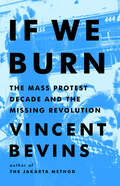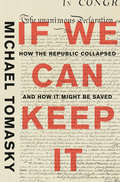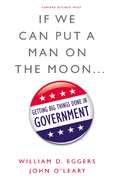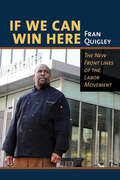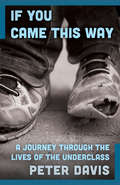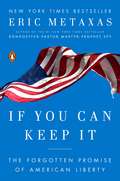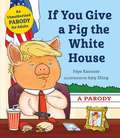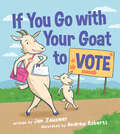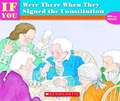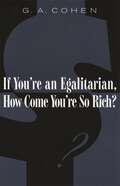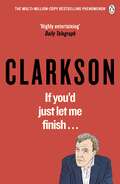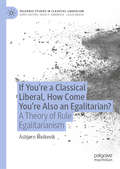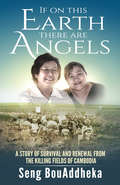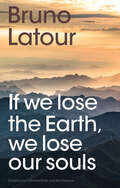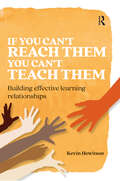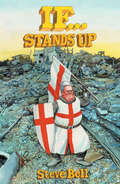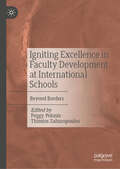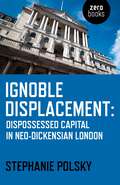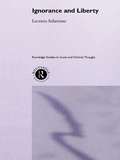- Table View
- List View
If We Burn: The Mass Protest Decade and the Missing Revolution
by Vincent Bevins&“A remarkable new history&” (David Wallace-Wells, New York Times Magazine) of a decade aflame—and what we can learn from its embers From 2010 to 2020, more people participated in protests than at any other point in human history. Yet we are not living in more just and democratic societies as a result. Acclaimed journalist Vincent Bevins carried out hundreds of interviews around the world, guided by a single, puzzling question: How did so many mass protests lead to the opposite of what they asked for? The result is a stirring work of history that connects events in a dozen countries and reveals that conventional wisdom on revolutionary change is gravely misguided. From the so-called Arab Spring to Gezi Park in Turkey, from Ukraine&’s Euromaidan to student rebellions in Chile and Hong Kong, Bevins provides a blow-by-blow account of street movements and their consequences, recounted in gripping detail. In this groundbreaking study of an extraordinary chain of events, protesters and major actors look back on successes and defeats, offering urgent lessons for the future.
If We Can Keep It: A Brief, 300-year History Of The Fall Of The Republic
by Michael TomaskyA game-changing account of the deep roots of political polarization in America, including an audacious fourteen-point agenda for how to fix it. Why has American politics fallen into such a state of horrible dysfunction? Can it ever be fixed? These are the questions that motivate Michael Tomasky’s deeply original examination into the origins of our hopelessly polarized nation. “One of America’s finest political commentators” (Michael J. Sandel), Tomasky ranges across centuries and disciplines to show how America has almost always had two dominant parties that are existentially, and often violently, opposed. When he turns to our current era, he does so with striking insight that will challenge readers to reexamine what they thought they knew. Finally, not content merely to diagnose these problems, Tomasky offers a provocative agenda for how we can help fix our broken political system—from ranked-choice voting and at-large congressional elections to expanding high school civics education nationwide. Combining revelatory data with trenchant analysis, Tomasky tells us how the nation broke apart and points us toward a more hopeful political future.
If We Can Put a Man on the Moon
by William D. Eggers John O'LearyThe American people are frustrated with their government-dismayed by a series of high-profile failures (Iraq, Katrina, the financial meltdown) that seems to just keep getting longer. Yet our nation has a proud history of great achievements: victory in World War II, our national highway system, welfare reform, the moon landing.We need more successes like these to reclaim government's legacy of competence. In If We Can Put a Man on the Moon, William Eggers and John O'Leary explain how to do it. The key? Understand-and avoid-the common pitfalls that trip up public-sector leaders during the journey from idea to results.The authors identify pitfalls including:-The Partial Map Trap: Fumbling handoffs throughout project execution-The Tolstoy Syndrome: Seeing only the possibilities you want to see-Design-Free Design: Designing policies for passage through the legislature, not for implementation-The Overconfidence Trap: Creating unrealistic budgets and timelines-The Complacency Trap: Failing to recognize that a program needs changeAt a time of unprecedented challenges, this book, with its abundant examples and hands-on advice, is the essential guide to making our government work better. A must-read for every public official, this book will be of interest to anyone who cares about the future of democracy.
If We Can Win Here: The New Front Lines of the Labor Movement
by Fran QuigleyDo service-sector workers represent the future of the U.S. labor movement? Mid-twentieth-century union activism transformed manufacturing jobs from backbreaking, low-wage work into careers that allowed workers to buy homes and send their kids to college. Some union activists insist that there is no reason why service-sector workers cannot follow that same path. In If We Can Win Here, Fran Quigley tells the stories of janitors, fry cooks, and health care aides trying to fight their way to middle-class incomes in Indianapolis. He also chronicles the struggles of the union organizers with whom the workers have made common cause. The service-sector workers of Indianapolis mirror the city's demographics: they are white, African American, and Latino. In contrast, the union organizers are mostly white and younger than the workers they help rally. Quigley chronicles these allies' setbacks, victories, bonds, and conflicts while placing their journey in the broader context of the global economy and labor history. As one Indiana-based organizer says of the struggle being waged in a state that has earned a reputation as antiunion: "If we can win here, we can win anywhere." The outcome of the battle of Indianapolis may foretell the fate of workers across the United States.
If You Ask Me: Essential Advice from Eleanor Roosevelt
by Eleanor Roosevelt Mary Jo BinkerExperience the timeless wit and wisdom of Eleanor Roosevelt in this annotated collection of candid advice columns that she wrote for more than twenty years.In 1941, Eleanor Roosevelt embarked on a new career as an advice columnist. She had already transformed the role of first lady with her regular press conferences, her activism on behalf of women, minorities, and youth, her lecture tours, and her syndicated newspaper column. When Ladies Home Journal offered her an advice column, she embraced it as yet another way for her to connect with the public. “If You Ask Me” quickly became a lifeline for Americans of all ages. Over the twenty years that Eleanor wrote her advice column, no question was too trivial and no topic was out of bounds. Practical, warm-hearted, and often witty, Eleanor’s answers were so forthright her editors included a disclaimer that her views were not necessarily those of the magazines or the Roosevelt administration. Asked, for example, if she had any Republican friends, she replied, “I hope so.” Queried about whether or when she would retire, she said, “I never plan ahead.” As for the suggestion that federal or state governments build public bomb shelters, she considered the idea “nonsense.” Covering a wide variety of topics—everything from war, peace, and politics to love, marriage, religion, and popular culture—these columns reveal Eleanor Roosevelt’s warmth, humanity, and timeless relevance.
If You Came This Way
by Peter DavisWhen the acclaimed author of Where Is Nicaragua? went in search of America's growing underclass--the persistent poor--he discovered a frighteningly large segment of the population for whom our cherished notions of equal opportunity and freedom for all are nothing but a mockery. Told in starkly human terms, courageous and compassionate, If You Came This Way is Peter Davis's shattering sojourn among our hopelessly impoverished fellow Americans . . . young and old, victims and vagabonds, the struggling unemployed and the simply unemployable. Their strengths and weaknesses, fears and anxieties, needs and desires will surprise and haunt you. Praise for Peter Davis's. Where Is Nicaragua? "This superb book is not only the definitive news about Nicaragua; it makes the ongoing news finally understandable. It is as elegantly written as V. S. Naipul's The Loss of El Dorado. Mr. Davis does not make his case in the manner of the polemicist; he convinces us morally in the manner of a good novelist. " --John Irving. "Stunning piece of firsthand reportage. . . he has captured the nuance, the ambiguity, the irony and the outright comedy of life among the Sandinistas and the contras. " --J. Anthony Lukas. "A brilliant examination of the process of revolution in Central America by a most gifted writer. Wonderfully written, it is filled with pleasures and insights. --Robert Stone.
If You Can Keep It: The Forgotten Promise of American Liberty
by Eric Metaxas#1 New York Times bestselling author Eric Metaxas delivers an extraordinary book that is part history and part rousing call to arms, steeped in a critical analysis of our founding fathers' original intentions for America.In 1787, when the Constitution was drafted, a woman asked Ben Franklin what the founders had given the American people. "A republic," he shot back, "if you can keep it." More than two centuries later, Metaxas examines what that means and how we are doing on that score.If You Can Keep It is at once a thrilling review of America's uniqueness--including our role as a "nation of nations"--and a chilling reminder that America's greatness cannot continue unless we embrace our own crucial role in living out what the founders entrusted to us. Metaxas explains that America is not a nation bounded by ethnic identity or geography, but rather by a radical and unprecedented idea, based on liberty and freedom for all. He cautions us that it's nearly past time we reconnect to that idea, or we may lose the very foundation of what made us exceptional in the first place.From the Hardcover edition.
If You Give a Pig the White House: A Parody for Adults
by Faye KanouseA coiffed and blustery pig has shoved his way into the White House! A cleverly worded and illustrated picture book, this is the adult parody of the beloved children’s cautionary tale, If You Give a Pig a Pancake. Watch in dismay as the presidential pig gets into trouble, binges on too much Fox News and fast food, and cavalierly threatens national security. If You Give a Pig the White House both lovingly caricatures the original children's book series and shows just what can happen when a greedy anti-hero tracks his hooves all over America.
If You Go with Your Goat to Vote
by Jan ZauzmerWhat happens when you go with your grown-up to vote? If you are a kid, you may chew over the ballot. If you are a bunny, you may hop to the polling place. If you are a piglet, you may squeal with delight when you get a sticker. And best of all, if you go with your grown-up to vote . . . you will grow up to vote yourself! Lighthearted and colorful, If You Go with Your Goat to Vote shows little ones just what to expect on Election Day—and will inspire grown-ups to be model voters.
If You Want Something Done: Leadership Lessons from Bold Women
by Nikki R. HaleyInstant New York Times and USA Today bestseller! Nikki Haley's sharply intimate and inspirational book celebrates the world's most iconic women leaders.“If you want something said, ask a man. If you want something done, ask a woman.” —Margaret ThatcherIn the spirit of Thatcher’s quote, Ambassador Nikki R. Haley offers inspiring examples of women who worked against obstacles and opposition to get things done—including Haley herself. As a brown girl growing up in Bamberg, South Carolina, no one would have predicted she would become the first minority female governor in America, the first female and the first minority governor in South Carolina, or the U.S. ambassador to the United Nations. Her journey wasn’t an easy one. She faced many people who thought she didn’t belong—and who told her so. She was too brown. Too female. Too young. Too conservative. Too principled. Too idealistic. As far as Nikki was concerned, those were not reasons to hold her back. Those were all reasons to forge ahead. She drew inspiration from other trailblazing women throughout history who summoned the courage to be different and lead. This personal and compelling book celebrates ten remarkable women who dared to be bold, from household names like Margaret Thatcher and Israel’s former prime minister Golda Meir, to Jeane Kirkpatrick, the first female U.S. ambassador to the United Nations, to lesser-known leaders like human rights activist Cindy Warmbier, education advocate Virginia Walden Ford, civil rights pioneer Claudette Colvin, and more. Woven with stories from Haley’s own childhood and political career, If You Want Something Done will inspire the next generation of leaders.
If You Want a Friend in Washington: Wacky, Wild & Wonderful Presidential Pets
by Erin McGillA clever, funny, and informative look at the pets--from Calvin Coolidge's wallaby to Teddy Roosevelt's flying squirrels--that have passed through the White House gates. Perfect for fans of I Am George Washington and So You Want to Be President?President Truman famously said, "If you want a friend in Washington, get a dog." And a dog is what many presidents got. From James Garfield to Calvin Coolidge to Richard Nixon, presidents often found a friend in Fido (in fact, Abe Lincoln's pup was actually named Fido). Others preferred cats, horses, small critters, or even big, ferocious animals like bears and alligators. With a catchy refrain ("If you want a friend in Washington . . . , "), this is a funny, educational book about the animals that have passed through the White House. Whether it's favorite dogs like Barbara Bush's Millie or the Obamas' Bo; Abraham Lincoln's cat, Dixie; Calvin Coolidge's hippo, Billy; or Andrew Jackson's foul-mouthed parrot, Poll, Erin McGill brings to life a menagerie of presidential pets in this entertaining, whimsical, and carefully researched picture book that's perfect for animal lovers and history buffs alike.
If You Were There When They Signed the Constitution (If You Ser.)
by Joan Holub Elizabeth LevyNIMAC-sourced textbook
If You're an Egalitarian, How Come You’re So Rich?
by G. A. CohenThis book presents G. A. Cohen's Gifford Lectures, delivered at the University of Edinburgh in 1996. Focusing on Marxism and Rawlsian liberalism, Cohen draws a connection between these thought systems and the choices that shape a person's life. In the case of Marxism, the relevant life is his own: a communist upbringing in the 1940s in Montreal, which induced a belief in a strongly socialist egalitarian doctrine. The narrative of Cohen's reckoning with that inheritance develops through a series of sophisticated engagements with the central questions of social and political philosophy. In the case of Rawlsian doctrine, Cohen looks to people's lives in general. He argues that egalitarian justice is not only, as Rawlsian liberalism teaches, a matter of rules that define the structure of society, but also a matter of personal attitude and choice. Personal attitude and choice are, moreover, the stuff of which social structure itself is made. Those truths have not informed political philosophy as much as they should, and Cohen's focus on them brings political philosophy closer to moral philosophy, and to the Judeo-Christian ethical tradition, than it has recently been.
If You’d Just Let Me Finish
by Jeremy ClarksonClarkson is back with a brand new book of hilarious stories and observations about our gone-wrong world. ___________In November 2016 we woke up to the news that the forthright presenter of a popular television programme had become the most powerful man on the planet. His name, sadly, was not Jeremy Clarkson, but we might not have been any more surprised if it had been.Because the world seems to have taken a decidedly odd turn since Jeremy last reflected on the state of things between the covers of a book. But who better than JC to help us navigate our way through the mess?And while he's being trying to make sense of it all he's discovered one or two things along the way, including- The disabling effects of being vegan- How Blackpool might be improved by drilling a hole through it- The problem with meditation- A perfect location for rebuilding Palmyra- Why Tom Cruise can worship lizards if he wants toIt's all been a bit unsettling.But don't worry. If You'd Just Let Me Finish is Clarkson at his best. He may be as bemused, exasperated, amused and surprised as the rest of us, but in a world gone crazy, thank God someone has still got his head screwed on ...Praise for Clarkson:'Brilliant...laugh-out-loud' - Daily Telegraph'Outrageously funny...will have you in stiches' - Time Out'Very funny...I cracked up laughing on the tube' - Evening Standard
If You’re a Classical Liberal, How Come You’re Also an Egalitarian?: A Theory of Rule Egalitarianism (Palgrave Studies in Classical Liberalism)
by Åsbjørn MelkevikClassical liberalism has wrongly been regarded as an ideology that rejects the welfare state. In this book, Åsbjørn Melkevik corrects this common reading of the classical liberal tradition by introducing a theory of “rule egalitarianism”. Not only is classical liberalism compatible with social justice, but it can also help us understand why some egalitarian endeavours are an essential feature of a market society. If a necessary link exists between the classical liberal tradition and the moral and institutional dimensions of the rule of law, then this tradition is bound to uphold a substantial form of social justice. Coherence requires that classical liberals like Friedrich Hayek and Milton Friedman adopt an authentic egalitarian program. They should ameliorate poverty and limit inequality not merely out of prudence or collective self-interest, but for the natural justice of ongoing social cooperation as well as for the impartiality of market institutions.
If a Poem Could Live and Breathe: A Novel of Teddy Roosevelt's First Love
by Mary CalviA fact-based romantic speculative novel about Teddy Roosevelt’s first love, by Mary Calvi, author of Dear George, Dear Mary.Studded with the real love letters between a young Theodore Roosevelt and Boston beauty Alice Lee—many of them never before published—If a Poem Could Live and Breathe makes vivid what many historians believe to be the pivotal years that made the future president into the man of action that defined his political life, and cemented his legacy.Cambridge, 1878. The era of the Gilded Age. Alice Lee sets out to break from the norms of her mother’s generation. Women are fighting for educational opportunities and exploring a new sense of intellectual and personal freedom. Native New Yorker, Harvard student Teddy Roosevelt, is on his own journey of discovery, and when they meet, unrelenting currents of love change the trajectory of his life forever. If a Poem Could Live and Breathe is an indelible portrait of the authenticity of first love, the heartache of loss, and how overcoming the worst of life’s obstacles can push one to greatness never imagined.
If on this Earth there are Angels: A story of survival and renewal from the Killing Fields of Cambodia
by Seng BouaddhekaIn April 1975, Addheka was a 14-year-old Cambodian girl who had only just learned to walk after being a polio victim as an infant. She was part of the forced evacuation from Phnom Penh of the entire population of the city and trudged to an unknown future with her large extended family Her beloved father, who produced two other families, altogether looked after 24 children and three wives. The families were soon scattered far and wide and lost touch with each other. The brutal, apocalyptic reality of the Pol Pot regime soon hit home, with devastating consequences for her family. For much of the next four years Addheka was alone, surviving unusual hardship and witnessing the fanatical, irrational, murderous reality of the Khmer Rouge regime. When it all ended, Addheka eventually returned to Phnom Penh to find out which of her family members had survived. She remained in Cambodia and became part of the reconstruction effort, working in a major hospital, then becoming a language teacher and Principal. She underwent a spiritual renewal and today runs the Aid Projects of Mercy for the very poorest children in Cambodia.
If the Gods Had Meant Us to Vote They Would Have Given Us Candidates: More Political Subversion from Jim Hightower (Revised Edition)
by Jim HightowerIf anything, in this presidential election special, he's madder than ever!In his earlier bestseller, There's Nothing in the Middle of the Road but Yellow Stripes and Dead Armadillos, Hightower only began to tap into the deep yearning that Americans have for a new politics that speaks to them from a real-world, kitchen-table perspective. Now, with the year 2000 being an especially significant marker for contemplating our country's direction, not only for the new year but for the new century and the new millennium, it's time for citizens to reclaim their political, economic, and cultural heritage.Leading the way with his hilariously irreverent yet profoundly serious book is our name-naming, podium-pounding, point-them-in-the-right-direction populist, Hightower himself. He whacks conventional wisdom right upside the head,showing,with startling facts and compelling personal stories, that despite a so-called period of prosperity, America's middle class is getting mugged, and that far from being ordained by the gods,globalization is globaloney! Hightower rips the mass off of the candidates, the parties, the consultants, and especially the moneyed powers whoa re supporting all of the leading presidential hopefuls. he's mad about them all--but what he's maddest about, what really gets his goat,is that they are all the same! To paraphrase Jim, American politicians are alike because they don't come cheap. In fact, they're all very expansive. which is why only the rich can own them and why their allegiance is definitely not to regular,worka-day citizens.No one is spared in this insightful and engaging blend of horror and success stories, hard-hitting commentary, laugh-out-loud humor, useful facts, and sparkling language. An equal opportunity muckraker and conscientious agitator for "We the people," Hightower inspires us to take charge again, to build a new politics, and, together, to build a better tomorrow. Jim Hightower's If the Gods Had Meant Us to Vote They Would Have Given Us Candidates proves yet again that his is a uniquely wise and peerlessly singular voice in the maelstrom of political prattle.
If we lose the Earth, we lose our souls
by Bruno LatourIn this book Bruno Latour calls upon Christians to join the struggle to avert a climate catastrophe. First and foremost, Christians need to overcome their lack of interest in “earthly things” and pay attention to the Earth at a time when it is being neglected. He also urges Christians to renew their understanding of their faith in the context of the new image of the world that has emerged from earth system science – that of a world in which the myriad of beings that inhabit the world are interdependent and living in close proximity on a slender, fragile membrane on the surface of the planet. This new image of the world cannot fail to have an impact on the sciences, on politics, and on religion, just as, in earlier centuries, the cosmology of Copernicus and Galileo upset the old order. Latour sees the ecological crisis, and the cosmological mutation that it entails, as an opportunity to convey anew, to the largest possible audience, the tradition of Christianity as it has never been appreciated before, by bringing to bear the lessons of eschatology on the great crisis that looms before us all.
If you can’t reach them you can’t teach them: Building effective learning relationships (Practical Teaching)
by Kevin HewitsonIf only there was one simple answer to all your teaching concerns. There is!This book argues that by focusing on building effective learning relationships with your pupils, everything else will fall into place. It can be the basis for positive behaviour management, stress reduction, student engagement and pupil progress. By identifying and then meeting the core set of needs we all possess in order to engage in any learning activity, you can improve teaching and learning and minimise challenge and stress. The text encourages you to reflect on your own practice throughout and plan for interventions and changes that will improve your teaching and the experiences of the learners in your care.This is not a theory book or an academic research tome; it is a straight talking, practical, thought provoking and insightful look into the challenges of being the best teacher you can be. Suitable for whatever stage you are at in your career, and whatever age group you teach, this book proposes a narrative that can work alongside the ever-increasing range of educational initiatives to which teachers are exposed.
If... Stands Up
by Steve BellA new satirical extravaganza from one of Britain&’s best-loved political cartoonistsSteve Bell&’s If… cartoon strip in the Guardian attracted generations of loyal readers. If… Stands Up is his hilarious commentary on our current political madness.Unmissable highlights include a Jubilee fly-past over Buckingham Palace by Boris Johnson&’s bottom. Liz Truss taking back control of her own eyeballs. A dead-horse race between zombie "Treeza" May and pink-rubber fiend David Cameron, towing his bijou shepherd&’s hut. Rishi Sunak flogging the skeletal remains of Margaret Thatcher. Donald Trump with a golden toilet seat brain. And Keir Starmer, aka Keeves the butler, assuring the toffs that "the below-stairs movement is realigning its values with those of the British people." If… Stands Up also keeps a gimlet eye on Charles and the Royals.Bell draws an unforgettable picture of a nation that has left reality behind. Why did the chlorinated chicken cross the Atlantic? Who needs hell when you have the Conservative Party? Might the Labour leadership simply be robots in disguise? In a world of war and chauvinism, Bell picks himself up and goes in search of a new source of laughs. In this, if nothing else, Westminster politics rarely disappoints.
Igniting Excellence in Faculty Development at International Schools: Beyond Borders
by Peggy Pelonis Thimios ZaharopoulosThis edited book offers diverse perspectives on the professional development of faculty, primarily at K-12 international schools. Contributions consider the many and complex facets of professional development – from administrative factors, assessment and accreditation issues to student needs through a diversity, equity and inclusion lens which acknowledges the differences in their backgrounds and cultures. The first part of the book examines the literature on professional development and presents a quantitative and qualitative study of international school leaders' views. The second part comprises examples of faculty professional development as testified by scholars who have implemented them in real life. The third part deals with important issues, concepts and applications regarding current faculty professional development such as accreditation, mental health, higher education and cultural identity. The book will appeal to researchers, education faculty and graduate education students.
Ignoble Displacement: Dispossessed Capital in Neo-Dickensian London
by Stephanie PolskyWe live in a time of great social, political and economic crisis that many date to the collapse of the global banking system in 2008. Many are finding it difficult to contextualise the hardships that have taken place in the years following on from those events. It is difficult to find the answers in our present media landscape, or in a political and intellectual climate that continues to laud capitalism as the winning economic system coming out of both World War II and the end of the Cold War, which has become over the last century synonymous with democracy itself. The irony is that in our times the majority of the world&’s people feel disenfranchised by both capitalism and democracy. How did we come to this historical juncture? What can we learn not just from history, but from our cultural artefacts that might tell us how we first came to conduct ourselves within a system of global finance capitalism? This volume proposes that we reinterpret the writings of Charles Dickens to find the antecedents of our present situation with regards to capital, empire and subjectivity.
Ignorance and Liberty (Routledge Studies in Social and Political Thought)
by Lorenzo InfantinoThose with a belief in open society base the demand for liberty on the recognition of human ignorance; we need to be free because we are ignorant and fallible. Free social cooperation permits us to mobilize our knowledge and develop methods of discovery through which we can explore the unknown and continually correct our errors. To assent to free cooperation is to accept critical discussion, democracy and the market and in this way we are able to increase our rationality and further political and economic development. Improvement in the conditions of our lives, therefore, does not come from the omniscience attributed to some enlightened legislator or planner. Ignorance and Liberty examines how the market is a place which liberates us from this idea of a privileged source of knowledge. The market is not only a place where goods are exchanged but also where different philosophical ideas and religious beliefs must co-habit, opening up new horizons and undermining the sense of an absolute that prevails in a closed world.
Ignored Racism: White Animus Toward Latinos
by Mark D. Ramirez David A. PetersonAlthough Latinos are now the largest non-majority group in the United States, existing research on white attitudes toward Latinos has focused almost exclusively on attitudes toward immigration. This book changes that. It argues that such accounts fundamentally underestimate the political power of whites' animus toward Latinos and thus miss how conflict extends well beyond immigration to issues such as voting rights, criminal punishment, policing, and which candidates to support. Providing historical and cultural context and drawing on rich survey and experimental evidence, the authors show that Latino racism-ethnicism is a coherent belief system about Latinos that is conceptually and empirically distinct from other forms of out-group hostility, and from partisanship and ideology. Moreover, animus toward Latinos has become a powerful force in contemporary American politics, shaping white public opinion in elections and across a number of important issue areas - and resulting in policies that harm Latinos disproportionately.
